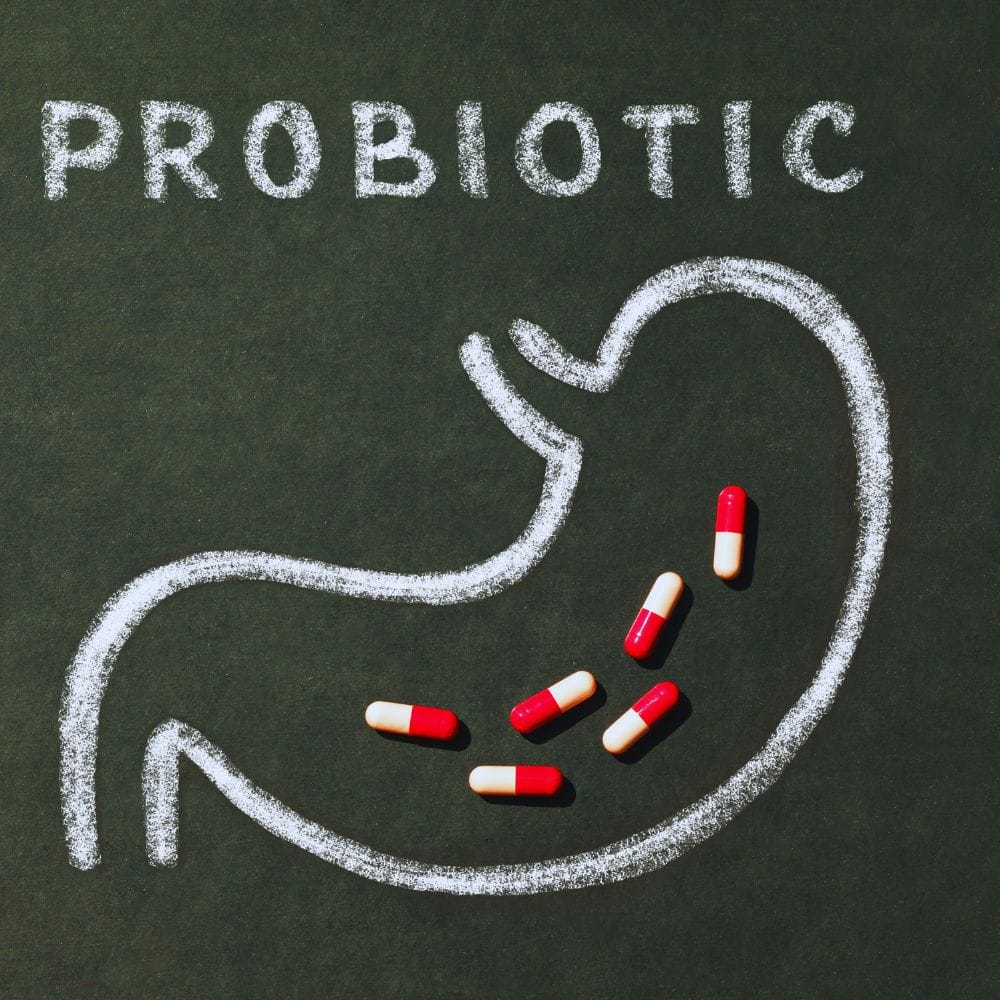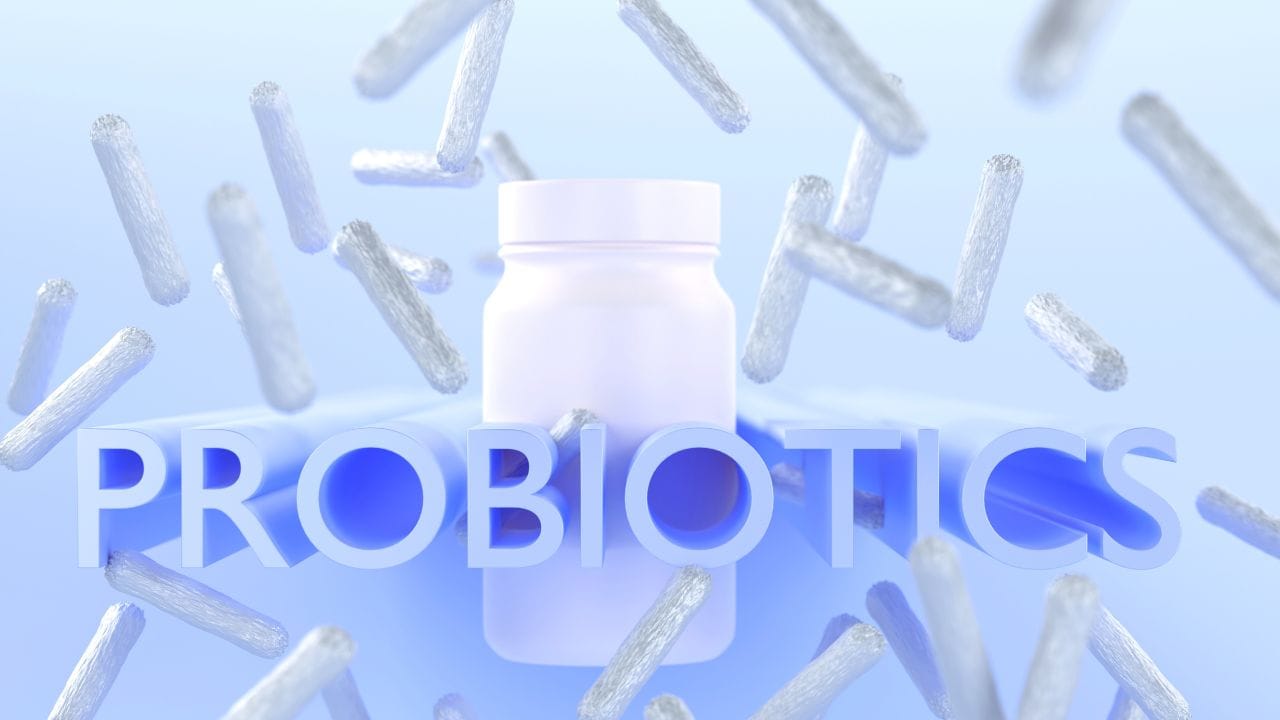Key Takeaways:
- Probiotics are live microorganisms that offer numerous health benefits, particularly for gut health and the immune system.
- Different strains of probiotics can aid in managing specific health conditions such as irritable bowel syndrome (IBS) and ulcerative colitis.
- Probiotic supplements and foods can enhance overall well-being, but it's crucial to choose the right strains for your needs.
Introduction to Probiotics
Probiotics, often referred to as “friendly bacteria,” are live microorganisms that provide a myriad of health benefits when consumed in adequate amounts. These beneficial bacteria are primarily known for their positive impact on gut health, but their influence extends far beyond the digestive system. From supporting mental health to boosting the immune system, probiotics play a crucial role in maintaining overall well-being.
Probiotic bacteria need to navigate through the harsh acidic environment of the stomach to reach the intestines, where they can thrive and contribute to gut health.
The concept of probiotics is not new; it dates back to the early 20th century when the Russian scientist Elie Metchnikoff first proposed that consuming fermented dairy products could promote longevity. Today, probiotics are widely recognized as a complementary and alternative medicine, with a growing body of research supporting their potential health benefits. As we delve deeper into the world of probiotics, we’ll explore how these tiny organisms can make a big difference in our health.
What Are Probiotics?
Probiotics are live microorganisms that, when administered in adequate amounts, confer a health benefit on the host. These beneficial bacteria and yeasts are naturally present in fermented foods like yogurt, kefir, sauerkraut, and kimchi. They can also be added to other food products or taken as dietary supplements. Probiotics are identified by their specific strain, which includes the genus, species, subspecies (if applicable), and an alphanumeric strain designation.
The seven core genera of microbial organisms most often used in probiotic products are Lactobacillus, Bifidobacterium, Saccharomyces, Streptococcus, Enterococcus, Escherichia, and Bacillus. Each of these genera contains multiple strains, each with unique properties and health benefits. For example, Lactobacillus and Bifidobacterium are commonly found in the human gut and are known for their positive effects on digestive health and immune function.
Understanding the specific strains and their benefits is crucial for selecting the right probiotic for your needs. Whether you’re looking to improve gut health, support immune function, or manage specific health conditions, incorporating probiotics through fermented foods or dietary supplements can be a valuable addition to your wellness routine.

The Science Behind Probiotics
Probiotics are live microorganisms, primarily bacteria, that are similar to the beneficial microorganisms found in the human gut. They are often referred to as "good bacteria" because they help maintain a healthy balance of microflora in the digestive tract. This balance is crucial for optimal digestion, nutrient absorption, and immune function.
The gut microbiome, a complex community of trillions of microorganisms residing in the gastrointestinal tract, plays a vital role in human health. Probiotics contribute to the diversity and stability of this microbiome, which is essential for preventing the overgrowth of harmful bacteria. By producing short-chain fatty acids and other metabolites, probiotics help maintain the integrity of the gut lining and support the body's natural defenses.
How Probiotics Work
Probiotics work by colonizing the gut and interacting with the existing intestinal microflora. They compete with harmful bacteria for nutrients and attachment sites, effectively crowding out potential pathogens. This competitive exclusion is one of the primary mechanisms through which probiotics exert their beneficial effects.
In addition to competing with harmful bacteria, probiotics also produce substances that inhibit the growth of pathogens. For example, certain strains of Lactobacillus and Bifidobacterium produce lactic acid, which lowers the pH of the gut environment, making it less hospitable for harmful bacteria. Probiotics also stimulate the production of antimicrobial peptides and enhance the activity of immune cells, further bolstering the body's defenses against infections.
Probiotics and Gut Health
Gut health is one of the most well-known benefits of probiotics. The digestive system is home to a diverse community of microorganisms that play a crucial role in digestion, nutrient absorption, and immune function. Probiotics help maintain a healthy balance of gut bacteria, which is essential for optimal digestive health.
Probiotic supplementation has been shown to alleviate symptoms of various gastrointestinal disorders, including irritable bowel syndrome (IBS), inflammatory bowel disease (IBD), and infectious diarrhea. By restoring the balance of gut microflora, probiotics can reduce inflammation, improve bowel regularity, and enhance the overall function of the digestive tract.

Probiotics and Mental Health
The gut-brain axis is a bidirectional communication network that links the central nervous system with the enteric nervous system in the gut. Emerging research suggests that probiotics may influence mental health by modulating this gut-brain axis. Certain probiotic strains have been shown to produce neurotransmitters such as serotonin and gamma-aminobutyric acid (GABA), which play a role in mood regulation.
Studies have demonstrated that probiotics can reduce symptoms of anxiety and depression, particularly in individuals with gut-related health problems. By improving gut health and reducing inflammation, probiotics may help alleviate the psychological symptoms associated with these conditions. While more research is needed to fully understand the mechanisms involved, the potential mental health benefits of probiotics are promising.
Probiotics and the Immune System
The immune system is intricately linked to the gut, with approximately 70% of the body's immune cells residing in the gastrointestinal tract. Probiotics play a crucial role in supporting immune function by enhancing the activity of immune cells and promoting the production of antibodies.
Certain probiotics, such as Lactobacillus reuteri and Bifidobacterium animalis, have been shown to boost the immune response and reduce the risk of infections. By maintaining a healthy balance of gut bacteria, probiotics help prevent the overgrowth of harmful pathogens and support the body's natural defenses. This immune-enhancing effect is particularly beneficial for individuals with weakened immune systems or those prone to infections.

Probiotics and Skin Health
The skin is the body's largest organ and serves as a barrier against environmental threats. Probiotics can support skin health by modulating the immune response and reducing inflammation. Certain probiotic strains have been shown to improve skin conditions such as acne, eczema, and rosacea.
By promoting a healthy balance of gut bacteria, probiotics can reduce systemic inflammation, which is often a contributing factor to skin conditions. Additionally, probiotics may enhance the skin's barrier function and improve hydration, leading to healthier, more resilient skin. While more research is needed to fully understand the relationship between probiotics and skin health, the potential benefits are encouraging.
Probiotics and Women's Health
Women's health can benefit significantly from probiotics, particularly in the areas of vaginal and urinary tract health. The vaginal microbiome is home to a diverse community of bacteria, with Lactobacillus species being the most dominant. These bacteria help maintain a low pH environment, which is crucial for preventing the overgrowth of harmful pathogens.
Probiotics can support vaginal health by restoring the balance of beneficial bacteria and reducing the risk of infections such as bacterial vaginosis and yeast infections. Additionally, probiotics may help prevent urinary tract infections (UTIs) by inhibiting the adhesion of harmful bacteria to the urinary tract lining. For women seeking natural solutions for maintaining reproductive health, probiotics offer a promising option.

Probiotics and Weight Loss
Weight loss is a complex process influenced by various factors, including diet, exercise, and metabolism. Emerging research suggests that probiotics may play a role in weight management by modulating the gut microbiome and influencing energy metabolism. In clinical studies, certain probiotic strains have been shown to reduce body weight and body fat.
Probiotics may aid weight loss by increasing the production of short-chain fatty acids, which can enhance fat oxidation and reduce fat storage. Additionally, probiotics may influence appetite regulation by modulating the release of hormones involved in hunger and satiety. While probiotics are not a magic bullet for weight loss, they can be a valuable addition to a comprehensive weight management plan.
Probiotics and Cholesterol Levels
Cholesterol levels are an important marker of cardiovascular health, and probiotics may help improve lipid profiles by modulating the gut microbiome. Certain probiotic strains, such as Lactobacillus reuteri and Bifidobacterium animalis, have been shown to reduce total cholesterol and low-density lipoprotein (LDL) cholesterol levels.
Probiotics may influence cholesterol metabolism by deconjugating bile acids, which are then excreted from the body. This process reduces the reabsorption of cholesterol and promotes its elimination. Additionally, probiotics may produce short-chain fatty acids that inhibit cholesterol synthesis in the liver. While more research is needed to fully understand the mechanisms involved, the potential cardiovascular benefits of probiotics are promising.
Probiotics and Digestive Disorders
Digestive disorders, such as irritable bowel syndrome (IBS) and inflammatory bowel disease (IBD), can significantly impact quality of life. Probiotics have been shown to alleviate symptoms of these conditions by restoring the balance of gut microflora and reducing inflammation.
While some studies suggest potential benefits of probiotics for managing ulcerative colitis, there is no evidence that probiotics help induce or maintain remission in Crohn's disease, emphasizing the need for further research in this area.
In individuals with IBS, probiotics can improve bowel regularity, reduce bloating, and alleviate abdominal pain. For those with IBD, such as Crohn’s disease and ulcerative colitis, probiotics may help reduce the frequency and severity of flare-ups. By modulating the immune response and enhancing the integrity of the gut lining, probiotics offer a promising complementary therapy for managing digestive disorders.
Probiotics and Infectious Diarrhea
Infectious diarrhea, often caused by bacteria, viruses, or parasites, can lead to dehydration and other complications. Probiotics have been shown to reduce the duration and severity of infectious diarrhea, particularly in children and travelers.
Certain probiotic strains, such as Lactobacillus rhamnosus GG and Saccharomyces boulardii, have been extensively studied for their ability to prevent and treat infectious diarrhea. By competing with pathogens for nutrients and attachment sites, probiotics can inhibit the growth of harmful microorganisms and promote a faster recovery. For individuals at risk of infectious diarrhea, probiotics offer a safe and effective preventive measure.
Probiotics and Food Products
Probiotics are commonly found in fermented foods, such as yogurt, kefir, sauerkraut, and kimchi. These foods contain live cultures of beneficial bacteria that can support gut health and overall well-being. Fermented dairy products, in particular, are a rich source of probiotics and have been consumed for centuries for their health benefits.
In addition to fermented foods, probiotics are also available in dietary supplements. These supplements provide a convenient way to increase probiotic intake, particularly for individuals who may not consume enough fermented foods. When choosing probiotic supplements, it's important to select products that contain specific strains with proven health benefits.
Probiotics and Clinical Nutrition
Clinical nutrition is an area of healthcare that focuses on the role of nutrition in the prevention and management of diseases. Probiotics are increasingly being recognized as a valuable component of clinical nutrition, particularly for individuals with specific health conditions.
Probiotic supplementation can support clinical nutrition by improving nutrient absorption, enhancing immune function, and reducing inflammation. For individuals with malabsorption disorders or compromised immune systems, probiotics can help optimize nutritional status and support overall health. As research continues to uncover the potential benefits of probiotics, their role in clinical nutrition is likely to expand.
Probiotics and the Food and Drug Administration
The Food and Drug Administration (FDA) regulates probiotics as dietary supplements, which means they are not subject to the same rigorous testing and approval process as pharmaceutical drugs. However, the FDA does require that probiotic products be safe and properly labeled.
Manufacturers of probiotic supplements must ensure that their products contain the specific strains listed on the label and that they meet quality standards. While the FDA does not evaluate the efficacy of probiotics, consumers can look for products that have been tested in clinical studies and have demonstrated health benefits.
Probiotics and the National Center for Complementary and Integrative Health
The National Center for Complementary and Integrative Health (NCCIH) is a division of the National Institutes of Health (NIH) that conducts research on complementary and alternative medicine, including probiotics. The NCCIH supports studies on the safety and efficacy of probiotics for various health conditions.
Research funded by the NCCIH has contributed to our understanding of how probiotics work and their potential health benefits. By supporting rigorous scientific research, the NCCIH helps ensure that consumers have access to evidence-based information about probiotics and their role in health and wellness.
Probiotics and Clinical Infectious Diseases
Clinical infectious diseases are a significant public health concern, and probiotics have been studied for their potential role in preventing and treating these conditions. Probiotics can support the body's natural defenses against infections by enhancing immune function and inhibiting the growth of pathogens.
Certain probiotic strains have been shown to reduce the risk of respiratory infections, urinary tract infections, and gastrointestinal infections. By maintaining a healthy balance of gut bacteria, probiotics can help prevent the overgrowth of harmful microorganisms and support the body's ability to fight off infections. As research continues to explore the potential benefits of probiotics for clinical infectious diseases, their role in preventive healthcare is likely to expand.
Probiotics and Clinical Gastroenterology
Clinical gastroenterology is a medical specialty that focuses on the diagnosis and treatment of digestive disorders. Probiotics are increasingly being recognized as a valuable tool in the management of gastrointestinal conditions, such as irritable bowel syndrome (IBS), inflammatory bowel disease (IBD), and infectious diarrhea.
Probiotics can support clinical gastroenterology by restoring the balance of gut microflora, reducing inflammation, and enhancing the integrity of the gut lining. For individuals with digestive disorders, probiotics offer a promising complementary therapy that can improve symptoms and enhance quality of life. As research continues to uncover the potential benefits of probiotics, their role in clinical gastroenterology is likely to expand.
Probiotics and the American Gastroenterological Association
The American Gastroenterological Association (AGA) is a professional organization dedicated to advancing the science and practice of gastroenterology. The AGA recognizes the potential benefits of probiotics for digestive health and supports research on their safety and efficacy.
The AGA provides guidelines for the use of probiotics in clinical practice, emphasizing the importance of selecting specific strains with proven health benefits. By supporting evidence-based research and providing guidance to healthcare professionals, the AGA helps ensure that probiotics are used safely and effectively in the management of digestive disorders.

Probiotics and the American Journal of Clinical Nutrition
The American Journal of Clinical Nutrition is a leading scientific journal that publishes research on the role of nutrition in health and disease. The journal has published numerous studies on the potential health benefits of probiotics, including their effects on gut health, immune function, and metabolic health.
Research published in the American Journal of Clinical Nutrition has contributed to our understanding of how probiotics work and their potential role in preventing and managing various health conditions. By providing a platform for high-quality research, the journal helps ensure that consumers and healthcare professionals have access to evidence-based information about probiotics and their role in health and wellness.
Probiotics and the Large Intestine
The large intestine, also known as the colon, is home to a diverse community of microorganisms that play a crucial role in digestion and immune function. Probiotics can support the health of the large intestine by promoting a healthy balance of gut bacteria and enhancing the production of short-chain fatty acids.
Short-chain fatty acids, such as butyrate, are produced by the fermentation of dietary fibers by gut bacteria. These fatty acids provide energy for the cells lining the colon and help maintain the integrity of the gut barrier. By promoting the production of short-chain fatty acids, probiotics can support the health of the large intestine and reduce the risk of gastrointestinal disorders.
Probiotics and the Small Intestine
The small intestine is responsible for the majority of nutrient absorption and plays a crucial role in digestion. Probiotics can support the health of the small intestine by enhancing nutrient absorption and promoting a healthy balance of gut bacteria.
Certain probiotic strains have been shown to improve the absorption of nutrients such as calcium, magnesium, and iron. By enhancing nutrient absorption, probiotics can support overall health and well-being. Additionally, probiotics can help prevent the overgrowth of harmful bacteria in the small intestine, reducing the risk of infections and other health problems.
Probiotics and the Digestive System
The digestive system is a complex network of organs and tissues that work together to break down food, absorb nutrients, and eliminate waste. Probiotics play a crucial role in supporting the health of the digestive system by promoting a healthy balance of gut bacteria and enhancing digestive function.
Probiotics can improve digestive health by reducing symptoms of gastrointestinal disorders, enhancing nutrient absorption, and supporting immune function. By maintaining a healthy balance of gut microflora, probiotics can help prevent the overgrowth of harmful bacteria and support the body's natural defenses against infections. For individuals seeking to improve their digestive health, probiotics offer a safe and effective option.
Probiotics and Other Fermented Foods
In addition to fermented dairy products, probiotics are also found in other fermented foods, such as sauerkraut, kimchi, and miso. These foods contain live cultures of beneficial bacteria that can support gut health and overall well-being.
Fermented foods have been consumed for centuries for their health benefits, and they continue to be a popular source of probiotics. By incorporating a variety of fermented foods into the diet, individuals can increase their intake of beneficial bacteria and support the health of their gut microbiome. For those seeking to improve their gut health, fermented foods offer a delicious and nutritious option.
Probiotics and Specific Probiotic Strains
Not all probiotics are created equal, and different strains of probiotics can have different effects on health. It's important to choose specific probiotic strains that have been shown to provide the desired health benefits.
For example, Lactobacillus rhamnosus GG is a well-studied strain that has been shown to reduce the risk of infectious diarrhea and improve symptoms of irritable bowel syndrome (IBS). Bifidobacterium animalis is another strain that has been shown to support immune function and reduce cholesterol levels. By selecting specific probiotic strains with proven health benefits, individuals can maximize the potential benefits of probiotic supplementation.

Probiotics and Probiotic Products
Probiotic products are available in various forms, including capsules, tablets, powders, and liquids. These products provide a convenient way to increase probiotic intake, particularly for individuals who may not consume enough fermented foods.
When choosing probiotic products, it's important to select products that contain specific strains with proven health benefits. Additionally, consumers should look for products that have been tested in clinical studies and have demonstrated efficacy. By choosing high-quality probiotic products, individuals can ensure that they are getting the most benefit from their probiotic supplementation.
Probiotics and Probiotic Candidates
Probiotic candidates are strains of bacteria that have been identified as having potential health benefits but have not yet been extensively studied. These candidates are often selected based on their ability to survive in the gastrointestinal tract and their potential to provide beneficial effects.
Research on probiotic candidates is ongoing, and new strains are continually being identified and studied for their potential health benefits. By exploring new probiotic candidates, researchers can expand our understanding of how probiotics work and their potential role in health and wellness.
Probiotics and Health Conditions
Probiotics have been studied for their potential role in managing various health conditions, including digestive disorders, mental health conditions, and skin conditions. By promoting a healthy balance of gut bacteria, probiotics can support overall health and well-being.
For individuals with specific health conditions, probiotics offer a promising complementary therapy that can improve symptoms and enhance quality of life. By selecting specific probiotic strains with proven health benefits, individuals can maximize the potential benefits of probiotic supplementation.
Probiotics and Potential Health Benefits
The potential health benefits of probiotics are vast and varied, ranging from improved gut health to enhanced immune function. By promoting a healthy balance of gut bacteria, probiotics can support overall health and well-being.
Probiotics have been shown to reduce symptoms of gastrointestinal disorders, improve mental health, support immune function, and enhance skin health. Additionally, probiotics may aid in weight management, reduce cholesterol levels, and support women's health. By incorporating probiotics into the diet, individuals can enjoy a wide range of potential health benefits.
Probiotics and Human Health
Human health is influenced by a complex interplay of genetic, environmental, and lifestyle factors. Probiotics can support human health by promoting a healthy balance of gut bacteria and enhancing overall well-being.
By improving gut health, supporting immune function, and reducing inflammation, probiotics can help prevent and manage various health conditions. For individuals seeking to improve their health and well-being, probiotics offer a safe and effective option.
Probiotics and Good Health
Good health is a state of physical, mental, and social well-being, and probiotics can play a crucial role in supporting overall health. By promoting a healthy balance of gut bacteria, probiotics can enhance digestive health, support immune function, and improve mental well-being.
For individuals seeking to improve their health and well-being, probiotics offer a safe and effective option. By incorporating probiotics into the diet, individuals can enjoy a wide range of potential health benefits and support their journey towards good health.

Probiotics and Taking Probiotics
Taking probiotics can be a simple and effective way to support overall health and well-being. By incorporating probiotics into the diet, individuals can enjoy a wide range of potential health benefits.
When taking probiotics, it's important to select specific strains with proven health benefits and to follow the recommended dosage. Additionally, individuals should consult with a healthcare professional before starting probiotic supplementation, particularly if they have underlying health conditions or are taking medications. By taking probiotics safely and effectively, individuals can maximize the potential benefits of probiotic supplementation.
Probiotics and Dietary Supplements
Dietary supplements are products that contain nutrients, herbs, or other substances intended to supplement the diet. Probiotics are a popular type of dietary supplement that can support overall health and well-being.
When choosing probiotic supplements, it's important to select products that contain specific strains with proven health benefits. Additionally, consumers should look for products that have been tested in clinical studies and have demonstrated efficacy. By choosing high-quality probiotic supplements, individuals can ensure that they are getting the most benefit from their probiotic supplementation.
Safety Considerations and Precautions
Probiotics are generally considered safe for most people, but it’s important to be aware of potential side effects and risks. Some individuals may experience mild gastrointestinal symptoms, such as gas, bloating, or an upset stomach, especially when first starting to take probiotics. These side effects are usually temporary and subside as the body adjusts.
However, probiotics may not be suitable for everyone. Individuals with compromised immune function, serious underlying diseases, or those who are critically ill should exercise caution. There have been rare cases of severe or fatal infections in premature infants who were given probiotics. The U.S. Food and Drug Administration (FDA) has issued warnings to healthcare providers about the risks associated with administering probiotics to premature infants.
It’s essential to consult with a healthcare professional before taking probiotics, especially if you have a weakened immune system, are taking medications, or have any underlying health conditions. By doing so, you can ensure that probiotics are safe and appropriate for your specific health needs.
Choosing the Right Probiotic
Choosing the right probiotic can be overwhelming given the numerous options available in the market. Here are some key factors to consider to help you make an informed decision:
- Human Studies and Proven Efficacy: Look for probiotics that have been tested in human studies and have a proven track record of safety and efficacy. Research-backed products are more likely to provide the desired health benefits.
- Health Condition Specificity: Choose a probiotic that is specifically formulated for your health condition. For example, certain strains are more effective for managing irritable bowel syndrome (IBS), ulcerative colitis, or Crohn’s disease.
- Probiotic Strain: Different strains of probiotics can have different effects on the body. Ensure that the product contains the specific strains that have been shown to benefit your particular health concern.
- Storage Conditions: Check the label for recommended storage conditions, such as refrigeration or room temperature, to ensure the probiotics remain viable.
- CFU Count: Ensure that the product label lists the total number of colony-forming units (CFUs) for each strain on the expiration or use-by date. A higher CFU count generally indicates a more potent product.
- Avoid Exaggerated Claims: Be wary of products that make exaggerated claims or promise a “quick fix.” Probiotics can support health, but they are not a cure-all.
- Consult a Healthcare Professional: Always consult with a healthcare professional before starting any new supplement regimen, especially if you have a weakened immune system or are taking medications.
By considering these factors, you can select a probiotic that is right for you and maximize the potential health benefits. Remember, the right probiotic can make a significant difference in your overall well-being.
Summary
Probiotics are live microorganisms that offer a wide range of health benefits, particularly for gut health and the immune system. By promoting a healthy balance of gut bacteria, probiotics can support overall health and well-being. From improving digestive health to enhancing immune function, probiotics offer a safe and effective option for individuals seeking to improve their health. By incorporating probiotics into the diet, individuals can enjoy a wide range of potential health benefits and support their journey towards good health.
As always, consult with your physician before starting any new supplement regimen to check about potential interactions with other supplements or medications. The information presented in this document is purely for educational purposes and should not be construed as medical advice.
While every effort has been made to ensure the accuracy and reliability of the information provided, all health-related decisions should be made in consultation with a qualified healthcare professional. The author does not take any liability for the health decisions made by the reader.
Good Guru Reviews may collect a share of sales or other compensation from the links on this page if you decide to buy something (at no additional cost to you, that's how we stay in business).
FAQ
Q1: What are the best sources of probiotics?
A1: The best sources of probiotics include fermented foods such as yogurt, kefir, sauerkraut, kimchi, and miso. These foods contain live cultures of beneficial bacteria that can support gut health and overall well-being. Additionally, probiotic supplements are available in various forms, including capsules, tablets, powders, and liquids.
Q2: Can probiotics help with weight loss?
A2: Emerging research suggests that probiotics may play a role in weight management by modulating the gut microbiome and influencing energy metabolism. In clinical studies, certain probiotic strains have been shown to reduce body weight and body fat. However, probiotics are not a magic bullet for weight loss and should be used as part of a comprehensive weight management plan.
Q3: Are there any side effects of taking probiotics?
A3: Probiotics are generally considered safe for most individuals, but some people may experience mild side effects such as gas, bloating, or an upset stomach. These side effects are usually temporary and subside as the body adjusts to the probiotics. Individuals with underlying health conditions or weakened immune systems should consult with a healthcare professional before starting probiotic supplementation.










